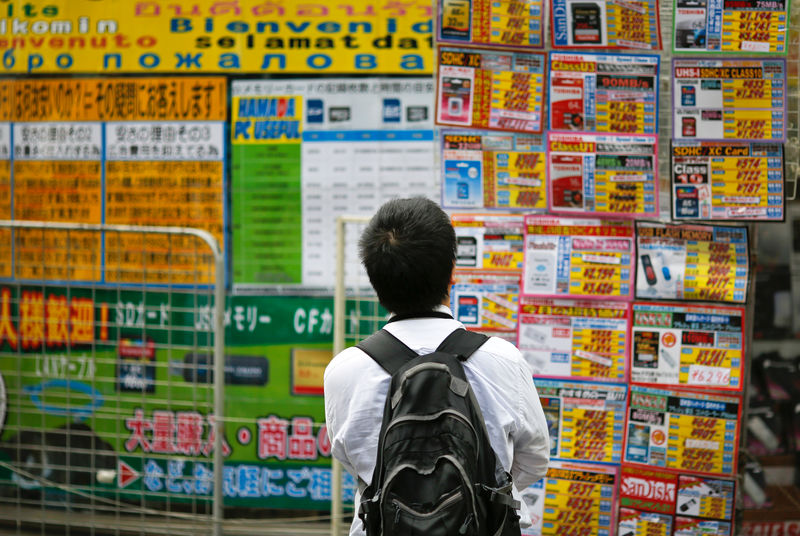By Leika Kihara
TOKYO (Reuters) - Japan's annual core consumer inflation slowed in February as gasoline costs fell for the first time in more than two years, keeping the central bank under pressure to maintain, or even ramp up, stimulus to accelerate price growth to its 2 percent target.
The data adds to growing signs that Sino-U.S. trade tensions and slowing global demand are hurting Japan's economic expansion and business sentiment.
If the weakness persists, the Bank of Japan (BOJ) may be forced to cut its inflation forecasts again at next month's rate review, analysts say, though policymakers are wary of expanding an already massive stimulus program any time soon.
The nationwide core consumer price index (CPI), which includes oil products but excludes volatile fresh food costs, rose 0.7 percent in February from a year earlier, government data showed on Friday, falling short of a median market forecast for a 0.8 percent gain.
The slowdown from January's 0.8 percent increase was due largely to a 1.3 percent drop in gasoline prices, which was the first year-on-year decline since November 2016, the data showed.
"As overseas economies begin to weaken, it's hard to project inflation hitting the BOJ's 2 percent target," said Takeshi Minami, chief economist at Norinchukin Research Institute.
"The BOJ is likely to maintain its current policy at next month's rate review," though it could ponder additional easing at some point given the recent weak data, he said.
An index the BOJ focuses on - the so-called core-core CPI that strips away the effect of both volatile food and energy costs - rose 0.4 percent in February, unchanged from the previous month's gain.
The costs of labour and shipping are pushing up prices of food items such as soft drinks, yoghurt, ramen noodles and ice cream. However, frugal consumers are resisting price hikes, capping retail prices and underscoring an entrenched deflationary mindset that Japan has been trying to overcome for decades.
Companies like Coca-Cola (NYSE:KO) Bottlers Japan Holdings Inc, Suntory Beverage & Food and potato chips maker Calbee Inc, have warned of falls in profits as the planned price hikes fail to cover rising upstream costs.
BOJ IN A BIND
The BOJ faces a dilemma. Years of heavy money printing have dried up market liquidity and hurt commercial banks' profits, stoking concerns over the rising risks of prolonged easing.
And yet, subdued inflation has left the BOJ well behind its U.S. and European counterparts in dialling back crisis-mode policies, and with a dearth of ammunition to battle an abrupt yen spike that could derail an export-driven economic recovery.
Further complicating the BOJ's struggle with low inflation, falling global bond yields in the wake of the U.S Federal Reserve's move to pause interest rate hikes for the rest of this year, have sent the JGB yield to 2-1/2 year lows.
The benchmark 10-year government bond yield fell below minus 0.050 percent to the lowest level since November 2016, making it more difficult for the central bank to ease policy further given the side-effects on financial institutions and market functions.
BOJ Governor Haruhiko Kuroda has stressed the central bank will no longer ease policy just to fire up inflation, and focus instead on the momentum generated by the economy to push up prices.
The central bank earlier this month maintained its view that Japan's economy is expanding moderately, signaling that it was in no hurry to expand stimulus.

Yet that view is becoming increasingly tenuous. In March, the government downgraded its economic assessment for the first time in three years, nodding to growing signs of weakness in exports and output.